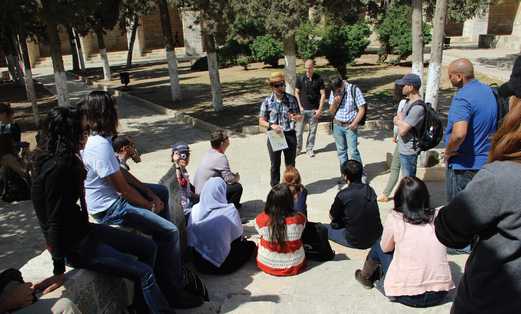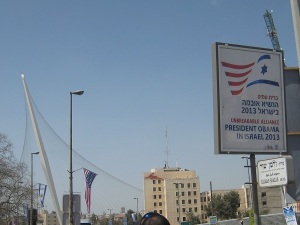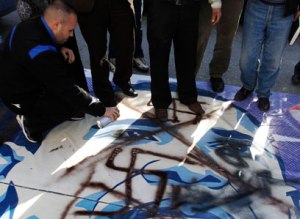It looks like my next piece just got published. I think this Jerusalem Post Metro piece, titled “On the Online Front,” will be interesting for those interested in learning about Israel’s PR behind the scenes, both the good, bad, and complicated aspects of it. What is also unique about this piece is that the group, called Ambassadors Online, consists of a number of Arab students, which are usually underrepresented in such public diplomacy activities. Without further ado, here is the article (beyond the paywall). As always, let me know what you think.
_ _ _ _ _
On the online front
A diverse group of University of Haifa students gains skills in new media and learns about ‘Jerusalem behind the headlines’ to represent Israel in the Internet age.
By LAURA ROSBROW

Photo by: Ifat Segal
‘I’m an Israeli citizen, and many things are said about Israel that are not true. I want to show a true picture of Israel. It’s not all protests.”
Ayat Rahal does not fit the typical profile of a pro- Israeli hasbara, or public diplomacy, activist. She is a Muslim Beduin student at the University of Haifa from Rumat al-Heib in the Galilee. For her, participating in Ambassadors Online (Shagririm Bareshet), which trains students to represent Israel as unofficial ambassadors in the international arena, is crucial for promoting coexistence. “As a Muslim, I think [doing hasbara] is important for coexistence. People don’t understand that we live together, we study together, and do everything together. I want to show what life is really like here.”
Rahal, several Druse participants, a Polish exchange student, a Jewish new immigrant from Venezuela and 25 Jewish Israelis make up Ambassadors Online’s second cohort. The students were chosen from over 60 applicants, with more applicants in this round than the first group last year.
Ambassadors Online’s goal is to train students in new media skills, such as social media, blogging and filmmaking, so they can defend and represent Israel online. David Gurevich, a PhD candidate in the Department of Archeology at the University of Haifa and the program’s director, founded the program last year with Prof. Eli Avraham, a senior faculty member in the Department of Communications. The project is co-sponsored by the university, its student union and the ISEF Foundation. Although the cohort was supposed to begin in the fall semester, it was delayed to the spring semester because of a lack of funds.
Gurevich says the group’s diversity reflects the range of students that are passionate about representing Israel: “You can see that we have totally various populations here. What unites everyone is they feel connected to this country and want to stand for it.”
He also says that Ambassadors Online does not have a political orientation. “We’re saying, ‘Guys, you can be Left, you can be Right.’ The idea is we have a lot more in common here as Israelis, and that we can represent that common ground for the world.”
Several Jewish students wanted to participate because they feel Israel is misunderstood abroad. Maya Zaliuk- Sharabany says, “I wanted to be in this project because whenever I go abroad, it is hard for me to talk about Israel, to answer people’s questions. I’m glad to take a course that prepares me to do that.”
For Maya Beinin, the rationale behind Israel’s actions is obvious. But she does not think this understanding translates to foreign audiences. “Israel’s hasbara is really bad. The world doesn’t understand us.”
Perhaps Adam Asad, a master’s student in international relations who wants to become a diplomat, will improve Israeli hasbara in the future. Like Rahal, he also does hasbara in part to promote coexistence. “I really want to represent Israel from my point of view as Arab, as Druse, from Israel. I want to show the Israeli side. It’s not understood in the world that there are Arabs in Israel and they can represent Israel… I believe in coexistence.
I believe in interfaith dialogue inside and outside of Israel. That’s why I attended this program.”
To familiarize participants with the central issues that make up headlines about Israel, Gurevich leads a tour called “Jerusalem behind the headlines.” In the tour, the group visits controversial places in the Jerusalem area – such as the Temple Mount and Ma’aleh Adumim – as well as the Foreign Affairs Ministry. Gurevich hopes the tour shows “how complicated the situation is, and some information about the solutions so each one can go home and decide for himself.” This reporter had the privilege to join the tour.
On the two-and-a-half-hour bus ride from Haifa to Jerusalem, Gurevich lectures almost the entire time.
He covers many of the main aspects of a peace agreement between Israel and the Palestinians, providing facts that defend Israel or complicate one’s views towards solutions to the Israeli-Palestinian conflict.
For most of the participants on the tour, it is their first time visiting the Temple Mount. Many smile, rush to take pictures of the golden dome and pose with friends as Gurevich guides.
Later in the tour, the group visits the intersection where Ma’aleh Adumim borders E1, a hotly contested territory adjacent to east Jerusalem. Although Gurevich says that E1 “does create a territorial sequence for Israel,” which some claim threatens the feasibility of a contiguous future Palestinian state, “that it prevents territorial continuity in the Palestinian state, that is just not true factually… What it does is prevent connecting east Jerusalem to that future Palestinian state… Right, not right, smart, not smart, that’s the situation. But it’s important to know the facts. The fact is that building in E1 does not prevent a two-state solution.”
Gurevich first statement that it is important to know “the facts,” and his further statement that building in E1 does not prevent a two-state solution illustrates part of the tour’s perspective.
The next stop is the Foreign Ministry, where officials present Israel’s hasbara strategy to Ambassadors Online. Ilana Stein, ministry vice spokeswoman, discusses hasbara’s “creative energy” strategy, which focuses on topics such as start-ups, the arts, and “cool” events taking place in Israel. The goal is for more people to engage with Israel through positive, non-political channels. She also encourages Ambassadors Online participants to write about fun experiences on social media sites so that peers can relate to Israel. Her motto for participants is, “Be truthful, authentic, say things that are fun.”
Although Stein’s advice is helpful, this reporter wanted to hear from the ministry about how it deals with the most difficult arguments against Israel.
When Eliya Rubinstein Benditovich, the ministry’s head of new media, is asked what the hardest question she ever found on the Internet was, she says, “The hardest questions are about delegitimization.
‘Why are you doing this?’ And it’s hard to answer because sometimes, yes, we’re doing this.” She then talks about what the office does during times of conflict.
This makes her reflect on Israel’s most recent operation, Pillar of Defense, which ended after a week of strikes between Gaza and Israel in November. “If the state had decided to continue with [the operation], our duty is to go along with it, to represent it.”
Therein lies hasbara’s greatest challenge: to make the case for all of Israel’s actions to audiences abroad.
Already, Ambassadors Online participants have organized a hasbara conference and created videos, blogs and pro-Israeli Facebook groups. Only time will tell if these students are up to the tough task of representing Israel. •


















